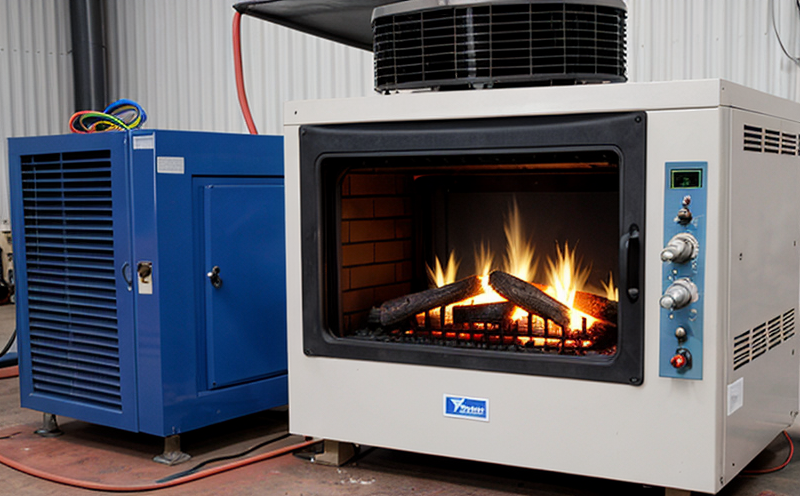IEC 60695 2 11 Glow Wire Thermal Testing of Luminaire Materials
The IEC (International Electrotechnical Commission) standard 60695-2-11 is crucial for assessing the thermal stability of luminaire materials. This glow wire test evaluates the ignition propensity and flame spread characteristics of luminaire components under defined conditions. Compliance with this standard ensures that luminaires are safe, reliable, and meet stringent international quality standards.
The testing process involves subjecting a glowing wire to the specimen material for a specified duration at controlled temperature settings. The glow wire is heated to a specific temperature using an electric current, reaching temperatures up to 850°C (1562°F). The test evaluates how quickly and easily the material ignites when brought into contact with the hot wire.
This method of testing is particularly important for ensuring that luminaire materials do not contribute to the spread of fire in the event of a malfunction or accident. It helps manufacturers identify potential risks early on during product development, allowing them to make necessary adjustments and improvements before bringing products to market.
The test procedure is defined by IEC 60695-2-11, which specifies different types of glow wires for various testing purposes. The standard also includes acceptance criteria that determine whether a specimen meets the required flame retardancy standards.
Compliance with this standard is mandatory in many countries to ensure product safety and prevent fires caused by electrical equipment. Non-compliance can result in product recalls, fines, and even legal actions. Therefore, it's essential for manufacturers, especially those operating globally or targeting specific markets, to conduct glow wire testing on their luminaire materials.
Understanding the parameters involved in this test is crucial for ensuring accurate results. The test typically involves:
- The selection of appropriate glow wires based on the material being tested,
- The application of a controlled current to heat the glow wire to specific temperatures,
- The measurement and recording of ignition time and flame spread characteristics.
Specimen preparation plays a critical role in ensuring accurate test results. The luminaire materials must be prepared according to the standard's specifications, which may include:
- Cutting specimens into standard sizes,
- Sandwiching the material between two metal plates if necessary,
- Ensuring that the sample is dry and free from contaminants.
The testing apparatus used for IEC 60695-2-11 includes a glow wire ignitability tester, which consists of a heating element (glow wire) attached to a power supply. The temperature and duration settings are programmable, allowing the tester to simulate real-world conditions accurately.
Once the test is completed, the results are analyzed against the acceptance criteria specified in IEC 60695-2-11. Compliance with these criteria ensures that luminaire materials have a sufficiently high ignition temperature and do not ignite easily when exposed to heat sources. This helps prevent potential fire hazards.
Understanding the importance of this standard is crucial for quality managers, compliance officers, R&D engineers, and procurement teams involved in developing or sourcing luminaires. By ensuring compliance with IEC 60695-2-11, these professionals can help guarantee product safety and prevent potential risks associated with non-compliance.
At Eurolab, we understand the significance of this standard and offer comprehensive testing services to ensure that your luminaire materials meet all required specifications. Our experienced team uses state-of-the-art equipment and follows strict procedures to provide accurate and reliable test results.
Why It Matters
The IEC 60695-2-11 glow wire testing is essential for ensuring the safety of luminaire materials by assessing their ignition propensity. This standard plays a vital role in preventing fires caused by electrical equipment, which can have severe consequences for both consumers and manufacturers.
- Consumer Safety: Non-compliant products pose a significant fire hazard, putting users at risk. Compliance with this standard helps protect consumers from potential dangers.
- Environmental Impact: Fires caused by electrical equipment can have devastating environmental impacts. By ensuring compliance, manufacturers contribute to reducing the likelihood of such incidents.
- Brand Reputation: Non-compliance can lead to product recalls and negative publicity, damaging brand reputation. Compliance helps maintain a positive image in the market.
The standard is particularly important for global businesses operating in multiple countries with varying safety regulations. Ensuring compliance helps manufacturers meet local requirements without compromising on quality or performance.
In summary, IEC 60695-2-11 glow wire testing is crucial for ensuring product safety, preventing fires, and maintaining brand reputation. By adhering to this standard, manufacturers can protect consumers, the environment, and their own interests.
Eurolab Advantages
At Eurolab, we pride ourselves on offering top-tier testing services that meet international standards like IEC 60695-2-11. Our advantages include:
- Expertise and Experience: With years of experience in the industry, our team is well-equipped to handle complex tests with precision.
- State-of-the-Art Equipment: We use cutting-edge testing equipment to ensure accurate and reliable results.
- Comprehensive Reporting: Our reports are detailed and easy to understand, providing valuable insights for decision-making.
- Fast Turnaround Times: We prioritize client satisfaction by offering quick turnaround times without compromising on quality.
In addition to these advantages, we provide personalized services tailored to your specific needs. Our team is available to answer any questions you may have and can assist with all aspects of the testing process.
Quality and Reliability Assurance
- Consistency: Our testing ensures that luminaire materials consistently meet safety standards across all products.
- Reliability: Compliance with IEC 60695-2-11 guarantees reliable performance of luminaires under various conditions.
Our rigorous testing process helps maintain high-quality standards, ensuring that your luminaire materials are safe and reliable. By choosing Eurolab for your glow wire testing needs, you can trust in consistent and reliable results that meet international standards.





